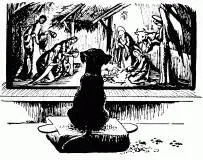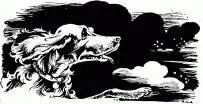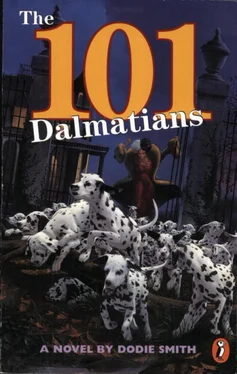“And a kind of a horse,” said Patch, remembering the helpful horse who had let them all out of the field.
“No dogs,” said the Cadpig. “What a pity! But I like it much better than ordinary television. Only I don’t know why.”
Then they heard Lucky and the others, who had found their way in. Soon every pup was lying curled up on a comfortable dog-bed and fast asleep—except the Cadpig. She had dragged along one of the dog-beds by its most convenient little carpet ear, and was sitting on it, wide awake, gazing and gazing at this new and far more beautiful television.

Once the moon came out from behind the clouds Pongo managed to mend the wheel—oh, the feeling of satisfaction when the peg slipped into place! Missis too felt proud. Had she not held the wheel? She, a dog who had never understood machinery! Quickly the two waiting pups seized the crossbar in their mouths. Then off they all went to the barn.
But as they drew nearer, Pongo saw this was no barn.
“Surely they can’t have gone in there? “ he said to Missis.
“Why not, if they were cold?” said Missis. “And they are far too young to know they would not be welcome.”
Pongo and Missis both knew that humans did not like dogs to go into buildings which had towers and tall, narrow windows. They had no idea why, and had at first been a little hurt when told firmly to wait outside. But Mrs. Dearly had once said, “We would love you to come in if it was allowed. And I would go in far oftener if you could.” So it was obviously one of those mysterious things such as no one—not even humans—ever being allowed to walk on certain parts of the grass in Regent’s Park.
“We must get them out quickly,” said Pongo, “and go on with our journey.”
They soon found the door in the tower—which the biggest pups had pushed wide open. Because Missis had always been left outside, she disliked these curious buildings with towers and high windows; but the minute she got inside she changed her mind. This was a wonderful place—so peaceful and, somehow, so welcoming.
“But where are the pups?” she said, peering all around.
She saw lots of black patches on the moonlit floor but had quite forgotten that all the pups were now black. Then she remembered and as she drew nearer to the sleeping pups, tears sprang to her eyes.
“Look, look at all the puppy-beds!” she cried. “What good people must live here!”
“It can’t be the kind of place I thought it was,” said Pongo.
He was about to wake the puppies when Missis stopped him. “Let me sit by the stove for a little while,” she said.
“Not too long, my dear,” said Pongo.
He need not have worried. Missis sat still for only a few minutes. Then she got up, shook herself, and said brightly, “Let us start now. Things are going to be all right.”
* * *
An hour or so later, just before the evening service, the Verger said to the Vicar, “I think there must be something wrong with the stove, sir.”
On every hassock he had found a small circular patch of soot.
“Last lap before supper,” said Pongo as they started off again across the moonlit fields.
It was the most cheering thing he could have said, for the ninety-seven puppies were now extremely hungry. He had guessed this because he was hungry himself. And so was Missis. But she was feeling too peaceful to mind.
They went on for nearly two miles; then Pongo saw a long row of cottage roofs ahead across the fields.

“This should be it,” he said.
“What is that glow in the sky beyond the roof-tops?” asked Missis. Pongo was puzzled. He had seen such a glow in the sky over towns which had many lights, but never over a village. And this was a very bright glow. “Perhaps it’s a larger place than we expected it to be,” he said, and did not feel it would be safe to go any nearer until some dog came to meet them. He called a halt and barked news of their arrival.
He was answered at once, by a bark that said, “Wait where you are. I am coming.” And though he did not tell Missis, Pongo felt there was something odd about this bark that answered his. For one thing, there were no cheerful words of welcome.
Soon a graceful red Setter came dashing towards them. They guessed, even before she spoke, that something was very wrong.
“The bakery’s on fire!” she gasped.
The blaze, due to a faulty chimney, had begun only a few minutes before—the fire engine had not yet arrived. No one had been hurt, but the bakehouse was full of flames and smoke—all the food spread out for the Dalmatians was burned.
“There’s nothing for you to eat and nowhere for you to sleep,” moaned the poor Setter—she was hysterical. “And the village street’s full of people.” She looked pitifully at Missis. “All your poor hungry puppies!”
The strange thing was that Missis felt quite calm. She tried to comfort the Setter, saying they would go to some barn.
“But no arrangements are made,” wailed the Setter. “And there’s no spare food anywhere. All the village dogs brought what they could to the bakery.”
Just then came a shrill whistle.
“My pet is calling me,” said the Setter. “He’s the doctor here. There’s no dog at the bakery, so I was chosen to arrange everything—because I took first prize in a dog show. And now I’ve failed you.”
“You have not failed,” said Missis. “No one could say the fire was act of dog. Go back to your pet and don’t worry. We shall simply go on to the next village.”
“ Really? ” said the Setter, gasping again—but with relief.
Missis kissed her on the nose. “Off with you, my dear, and don’t give the matter another thought. And thank you for all you did.”
The whistle came again, and the Setter ran off, wildly waving her feathered tail. “Feather-brained as well as feather-tailed,” said Pongo.
“Just very young,” said Missis gently. “I doubt if she’s had a family yet. Well, on to the next village.”
“Thank you for being so brave, dear Missis,” said Pongo. “But where is the next village?”
“In the country there are villages in every direction,” said Missis brightly.
Desperately worried though he was, Pongo smiled lovingly at her. Then he said, “We will go to the road now.”
“But what about traffic, Pongo?”
“We shall not be very long on the road,” said Pongo. Then he told her what he had decided. Even if the next village should only be a few miles away, many of the pups were too tired and too hungry to get there—some of them were already asleep on the frozen ground. And every minute it got colder.
“And even if we could get to the next village, where should we sleep, Missis, what should we eat, with no plans made ahead? We must give in, my dear. Come, wake the pups! Quick march, everyone!”
The waking pups whimpered and shivered, and Missis saw that even the strongest pups were now wretchedly cold. So she helped Pongo to make them all march briskly.
Then she whispered, “But how do we give in, Pongo?”
Pongo said, “We must go into the village and find the police station.”
Missis stared at him in horror. “No, Pongo, no! The police will take the puppies from us!”
“But they will feed them, Missis. And perhaps we shall be kept together until Mr. Dearly has been told about us. They will have read the papers. They will know we are the Missing Dalmatians.”
Читать дальше












